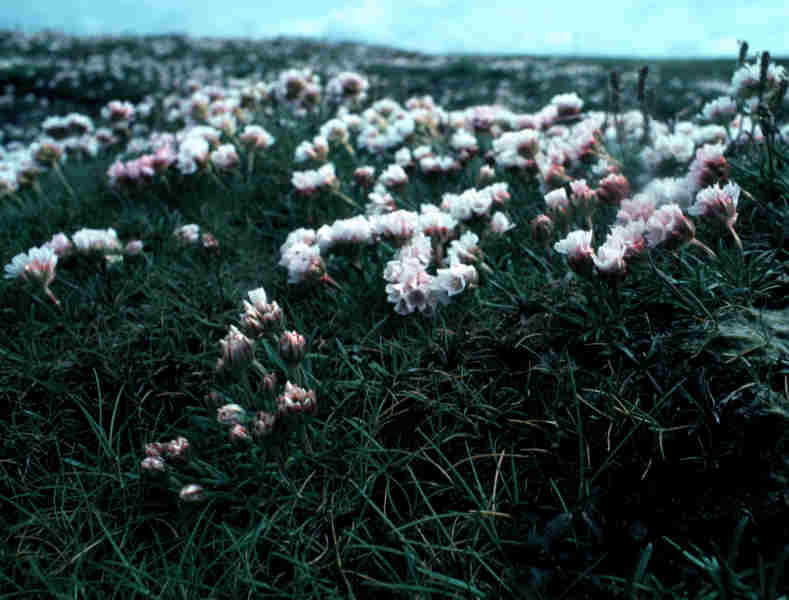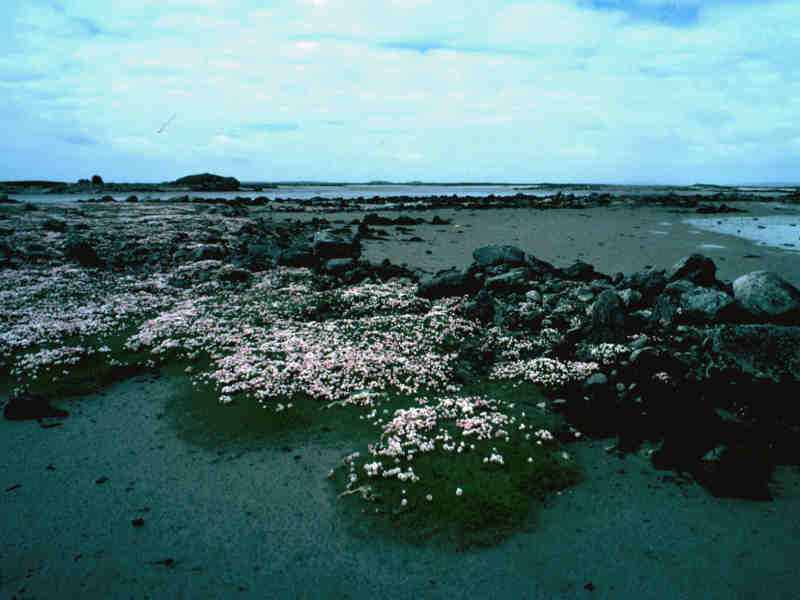Thrift (Armeria maritima)
Distribution data supplied by the Ocean Biodiversity Information System (OBIS). To interrogate UK data visit the NBN Atlas.Map Help
| Researched by | Joelene Hughes | Refereed by | Admin |
| Authority | Mill. | ||
| Other common names | - | Synonyms | Statice maritima |
Summary
Description
Recorded distribution in Britain and Ireland
Armeria maritima occurs all around the British Isles and Ireland. The subspecies Armeria maritima ssp. elongata is found in Lincolnshire but is very rare.Global distribution
Armeria maritima is found throughout Europe.Habitat
Armeria maritima is found on coasts, cliffs and salt marshes as well as inland on mountain ledges in Britain and Ireland.Depth range
-Identifying features
- Armeria maritima usually has pink flowers although they are infrequently white.
- The flower consists of five petals, about 8mm wide with stamens opposite the petals and five styles that are hairy towards their base.
- The hairy calyx (the whorl of 'sepals' which occur outside the petals), has five ribs and teeth up to 1mm deep.
- A brown, tubular sheath falls 2-3cm below the flower head.
- The flower stalk is unbranched and between 5-30cm high, emerging from a rosette of 2-10cm long leaves.
- The leaves have a single vein, may have hair along the margins and originate from a cushion-forming, woody rootstock.
Additional information
Armeria maritima includes two sub species, Armeria maritima ssp. elongata and Armeria maritima ssp. maritima. These subspecies are synonymous with Statice elongata or Armeria elongata, and Armeria pubescens or Armeria maritima ssp. planifolia respectively. The subspecies can be differentiated by the form of the stems, pubescent (with hairs) or glabrous (hairless) respectively.Listed by
- none -
Bibliography
Cronquist, A., 1988. The evolution and classification of flowering plants (2nd edn). New York: New York Botanical Garden.
Rodwell, J.S. (ed.), 2000. British plant communities, vol. 5, Maritime communities and vegetation of open habitats. Cambridge: Cambridge University Press.
Rose, F., 1981. The wild flower key. British Isles - N.W. Europe with keys to plants not in flower. London: The Penguin Group.
Stace, C., 1999. Field flora of the British Isles. Cambridge: Cambridge University Press.
Datasets
Botanical Society of Britain & Ireland, 2018. Other BSBI Scottish data up to 2012. Occurrence dataset: https://doi.org/10.15468/2dohar accessed via GBIF.org on 2018-09-25.
Botanical Society of Britain & Ireland, 2018. Scottish SNH-funded BSBI records. Occurrence dataset: https://doi.org/10.15468/llasrt accessed via GBIF.org on 2018-09-25.
Botanical Society of Britain & Ireland, 2018. Welsh BSBI data (ex-VPDB dataset) at hectad resolution. Occurrence dataset: https://doi.org/10.15468/rsvnif accessed via GBIF.org on 2018-09-25.
Bristol Regional Environmental Records Centre, 2017. BRERC species records recorded over 15 years ago. Occurrence dataset: https://doi.org/10.15468/h1ln5p accessed via GBIF.org on 2018-09-25.
Bristol Regional Environmental Records Centre, 2017. BRERC species records within last 15 years. Occurrence dataset: https://doi.org/10.15468/vntgox accessed via GBIF.org on 2018-09-25.
Cofnod – North Wales Environmental Information Service, 2018. Miscellaneous records held on the Cofnod database. Occurrence dataset: https://doi.org/10.15468/hcgqsi accessed via GBIF.org on 2018-09-25.
Cumbria Biodiversity Data Centre, 2018. Wildwatch North Pennines AONB project records for Cumbria. Occurrence dataset: https://doi.org/10.15468/05h2u8 accessed via GBIF.org on 2018-09-25.
Dorset Environmental Records Centre, 2017. Dorset Sites of Nature Conservation Interest (SNCI) species records 2000-2008. Occurrence dataset: https://doi.org/10.15468/r1ebqb accessed via GBIF.org on 2018-09-25.
Dorset Environmental Records Centre, 2017. Dorset Sites of Nature Conservation Interest (SNCI) species records pre 2000. Occurrence dataset: https://doi.org/10.15468/qyg29v accessed via GBIF.org on 2018-09-25.
Dorset Environmental Records Centre, 2017. Dorset SSSI Species Records 1952 - 2004 (Natural England). Occurrence dataset: https://doi.org/10.15468/vcjzts accessed via GBIF.org on 2018-09-25.
Environmental Records Information Centre North East, 2018. ERIC NE Combined dataset to 2017. Occurrence dataset: http://www.ericnortheast.org.ukl accessed via NBNAtlas.org on 2018-09-38
Fenwick, 2018. Aphotomarine. Occurrence dataset http://www.aphotomarine.com/index.html Accessed via NBNAtlas.org on 2018-10-01
Fife Nature Records Centre, 2018. Fife Nature Records Centre combined dataset. Occurrence dataset: https://doi.org/10.15468/ccc1ip accessed via GBIF.org on 2018-09-27.
Fife Nature Records Centre, 2018. St Andrews BioBlitz 2015. Occurrence dataset: https://doi.org/10.15468/xtrbvy accessed via GBIF.org on 2018-09-27.
Fife Nature Records Centre, 2018. St Andrews BioBlitz 2016. Occurrence dataset: https://doi.org/10.15468/146yiz accessed via GBIF.org on 2018-09-27.
Hertfordshire Natural History Society Flora Group, 2017. Hertfordshire Flora Survey Records 1987-2005. Occurrence dataset: https://doi.org/10.15468/ntvxgr accessed via GBIF.org on 2018-09-27.
John Muir Trust, 2017. Plants, Bryophytes and Lichens recorded on Quinag in 2006-2007. Occurrence dataset: https://doi.org/10.15468/fjkkc1 accessed via GBIF.org on 2018-09-27.
John Muir Trust, 2017. Plants, Bryophytes and Lichens recorded on Quinag in 2006-2007. Occurrence dataset: https://doi.org/10.15468/fjkkc1 accessed via GBIF.org on 2018-09-27.
John Muir Trust, 2017. Plants, Bryophytes and Lichens recorded on Quinag in 2006-2007. Occurrence dataset: https://doi.org/10.15468/fjkkc1 accessed via GBIF.org on 2018-09-27.
Lancashire Environment Record Network, 2018. LERN Records. Occurrence dataset: https://doi.org/10.15468/esxc9a accessed via GBIF.org on 2018-10-01.
Manx Biological Recording Partnership, 2017. Isle of Man wildlife records from 01/01/2000 to 13/02/2017. Occurrence dataset: https://doi.org/10.15468/mopwow accessed via GBIF.org on 2018-10-01.
Manx Biological Recording Partnership, 2018. Isle of Man historical wildlife records 1990 to 1994. Occurrence dataset: https://doi.org/10.15468/aru16v accessed via GBIF.org on 2018-10-01.
Manx Biological Recording Partnership, 2018. Isle of Man historical wildlife records 1995 to 1999. Occurrence dataset: https://doi.org/10.15468/lo2tge accessed via GBIF.org on 2018-10-01.
Manx Biological Recording Partnership, 2022. Isle of Man historical wildlife records 1990 to 1994. Occurrence dataset:https://doi.org/10.15468/aru16v accessed via GBIF.org on 2024-09-27.
Merseyside BioBank., 2017. Merseyside BioBank (verified). Occurrence dataset: https://doi.org/10.15468/ar0p6s accessed via GBIF.org on 2018-10-01.
Merseyside BioBank., 2018. Merseyside BioBank (unverified). Occurrence dataset: https://doi.org/10.15468/iou2ld accessed via GBIF.org on 2018-10-01.
National Trust, 2017. National Trust Species Records. Occurrence dataset: https://doi.org/10.15468/opc6g1 accessed via GBIF.org on 2018-10-01.
National Trust, 2018. Sutton Hoo species data held by The National Trust. Occurrence dataset: https://doi.org/10.15468/4etkkx accessed via GBIF.org on 2018-10-01.
NBN (National Biodiversity Network) Atlas. Available from: https://www.nbnatlas.org.
Norfolk Biodiversity Information Service, 2017. NBIS Records to December 2016. Occurrence dataset: https://doi.org/10.15468/jca5lo accessed via GBIF.org on 2018-10-01.
OBIS (Ocean Biodiversity Information System), 2025. Global map of species distribution using gridded data. Available from: Ocean Biogeographic Information System. www.iobis.org. Accessed: 2025-08-08
Record, 2017. RECORD Vascular Plant Data. Occurrence dataset https://doi.org/10.15468/nmdcir accessed via GBIF.org on 2018-10-02.
Rotherham Biological Records Centre, 2017. Rotherham Biological Records Centre - Non-sensitive Records from all taxonomic groups. Occurrence dataset: https://doi.org/10.15468/d3tufo accessed via GBIF.org on 2018-10-02.
Royal Botanic Garden Edinburgh, 2018. Royal Botanic Garden Edinburgh Herbarium (E). Occurrence dataset: https://doi.org/10.15468/ypoair accessed via GBIF.org on 2018-10-02.
South East Wales Biodiversity Records Centre, 2018. SEWBReC Vascular Plants (South East Wales). Occurrence dataset: https://doi.org/10.15468/7qjujd accessed via GBIF.org on 2018-10-02.
South East Wales Biodiversity Records Centre, 2018. Dr Mary Gillham Archive Project. Occurance dataset: http://www.sewbrec.org.uk/ accessed via NBNAtlas.org on 2018-10-02
Suffolk Biodiversity Information Service., 2017. Suffolk Biodiversity Information Service (SBIS) Dataset. Occurrence dataset: https://doi.org/10.15468/ab4vwo accessed via GBIF.org on 2018-10-02.
The Wildlife Information Centre, 2017. Natalie Harmsworth's Records (2010-2016). Occurrence dataset http://www.wildlifeinformation.co.uk/. Accessed via NBNAtlas.org/ on 2018-10-02.
The Wildlife Information Centre, 2018. TWIC Biodiversity Field Trip Data (1995-present). Occurrence dataset: https://doi.org/10.15468/ljc0ke accessed via GBIF.org on 2018-10-02.
West Wales Biodiversity Information Centre, 2017. WTSWW Data: All Taxa (West Wales). Occurrence dataset: https://doi.org/10.15468/gaakk2 accessed via GBIF.org on 2018-10-02.
Citation
This review can be cited as:
Last Updated: 01/08/2002




